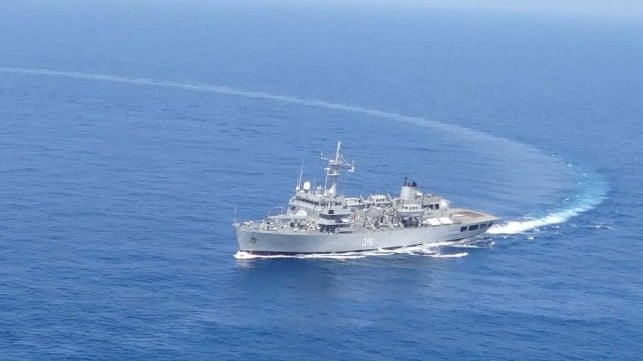In Sign of Cooling Ties, Maldives Reverses Hydrography Deal With India

With Maldives reviewing its defense relations with India, the new government of Maldives this week announced it will not renew its agreement with the Indian Navy on oceanographic surveys.
During a press conference this week, Maldives presidential spokesman Mohamed Firuzul Khaleel, explained the move is part of fulfilling the campaign pledges of President Mohammed Muizzu’s administration.
According to Firuzul, this includes repealing provisions on “secret bilateral agreements” signed by the former administration, which supposedly endanger Maldives’ independence and sovereignty.
“The administration has decided against renewing the hydrography agreement, which expires in June 7 next year. According to the terms of this agreement, if one party wishes to drop the agreement, the other party must be informed of the decision six months before the agreement is set to expire. Otherwise, the agreement automatically renews for an additional five years,” Firuzul elaborated.
India has already been informed of Maldives’ decision not to renew the agreement. In its place, future hydrography works will be done exclusively by the Maldives National Defense Force’s (MNDF). The president has also allocated additional funding to improve MNDF’s capacity.
The hydrography agreement between India and the Maldives was signed back in 2019, when Prime Minister Narendra Modi visited at the invitation of then-President of Maldives Ibrahim Mohamed Solih. Under the collaboration, the Indian Navy would conduct the survey, with the initiald phase covering Northern Maldives and the Male area. The survey was intended to gather data on the depth of the ocean floor, currents and waves, seabed composition and features.
One primary objective of the hydrographic survey was to update nautical charts around Maldives territory, which would prevent marine accidents and groundings, protecting marine ecosystems and people.
However, with the election of Mohammed Muizzu, who assumed office last month, ties between New Delhi and Male are likely to plunge. Muizzu is seen to be pro-China in his foreign policy, and he campaigned on a platform of ousting India, claiming that the Indian military presence compromised the sovereignty of the Maldives.

that matters most
Get the latest maritime news delivered to your inbox daily.
Hours after taking the oath of office, President Muizzu on November 18 issued a directive formally asking India to withdraw its military personnel from Maldives. Muizzu is also expected to review more than 100 agreements signed with India.
India was among the first countries to recognize the Maldives after its independence in 1965, and the two countries have been close allies ever since. In the past decade however, India-Maldives ties have started to fray. Specifically, the administration of Abdulla Yameen between 2013 and 2018 laid the groundwork for China’s influence in Maldives. It was during this period that Maldives joined China’s Belt and Road Initiative (BRI). This saw Maldives obtain more than $1 billion in loans from China, most of which went to finance infrastructural projects. For its part, India recently offered Maldives a $100 million grant and a $400 million line of credit for an infrastructure initiative, the Greater Male Connectivity Project (GMCP).
